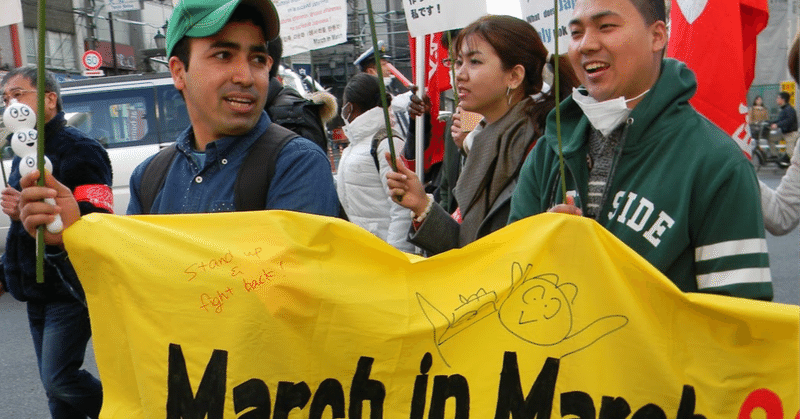
02 A Society in Which Migrants Can Fully Enjoy Workers’ Rights
Upon receiving a phone call from the Japan Pension Service Center, for a while, the clerical staff at a construction company could not understand what the Service Center staff was trying to say.
“What do you mean?”
“We are asking if you could change the order of the name of one of your employees. Is Ndaikya Emmanuel your employee?”
“Yes, he is.”
“We’d like you to ask him if the order of his name could be changed. We just can’t input a name starting with “n” into our computer system.”
Ndaikya came to Japan in the 1990s from Tanzania and has engaged in various types of work such as industrial waste disposal, demolition, and construction. He got married to a Japanese woman and acquired permanent residence and a driver’s license. He is now regarded as the “boss” in this construction company for which he works. Yet, Ndaikya, whose mother-tongue is Swahili, cannot read Japanese or English, and thus has difficulty understanding the workings of the Japanese public systems of health insurance, pension, and labor laws.
Meanwhile, his company decided that all of its employees should be enrolled in the social insurance system. Initially, Ndaikya was not happy about switching from the national health insurance system to the social insurance system because the amount he received was reduced. However, after receiving explanations from the clerical staff several times, he came to understand that enrolling in social insurance would benefit his wife and kids too – and he looked forward to receiving his social insurance card. However, the arrival of the card was severely delayed, and when the clerical staff made an inquiry to the Pension Service Center, it was discovered that they were confused over the order of his name. Back to the phone call:
“But there must be some way to input his name into the system.”
“No, we can’t handle his name due to the computer system. Isn’t it possible to change the order of his name?”
“No way. I won’t dare ask him such a thing.”
Of course, the response of the clerical staff was reasonable. The Pension Service Center’s way of thinking is what is problematic. Consulted by Ndaikya, a labor union immediately negotiated with the Service Center.
“Would you ask to change the order of his name if he was a Japanese?”
“We probably wouldn’t.”
“Have you ever asked the same thing when you handled similar cases?”
“We have, since our computer system cannot deal with such a name.”
“Why don’t you change the system?”
“......” (silence)
This issue was later discussed in a Diet session, and after six months, the computer system was changed. Ndaikya finally received his insurance card.
▶ Institutions that do not reflect the realities of migrant workers
It has already been 30 years since the “new comers” started coming into and working in Japan. Yet, the institutions and administrative bureaus still do not take the presence of those migrant workers with diverse backgrounds into consideration. It is a reality that over 1.72 million migrant workers are living and working in Japan (Figure 4). They contribute to Japanese society not only though their labor, but also through social systems such as health insurance, pension, and taxes. Despite this fact, they do not enjoy appropriate working environments and conditions as well as public services.
▶ Some necessities for migrant worker policies
An important element for policies for migrant workers is the guarantee of the right to move and work as workers. This means that there must be receiving procedures and working conditions that meet the international norms and standards of the likes of the Philadelphia Declaration, ensuring an equal relationship between labor and management. Policies to better protect their rights need to be considered from the perspectives of “empowerment of migrant workers” as well as “protection of workers.” Such policies would provide migrant workers with the right to negotiate with employers, the right to organize, and the right to strike, as they would be able to access and join labor unions. There is also a need for multi-lingual training opportunities so that migrant workers can have opportunities to improve their skills.
With regard to the protection of workers, there is a need for information dissemination in multiple languages about problems that exist in the workplace, work safety, health, and dangers, in order to ensure the effective application of labor laws. Also, there is a need for information dissemination about the use of Hello Work (the Japanese government's Employment Service Center), the eligibility for employment insurance for individuals out of work, and the right to apply for compensation for job-related injuries (such as in cases requiring medical treatment, absence from work, and compensation for aftereffects). There is also a need for cooperation and coordination with sending countries for medical follow-ups and the reintegration of workers who may have suffered industrial health problems due to dealing with harmful materials such as asbestos, dust, and radioactive materials.
Furthermore, with regard to receiving migrant workers, government policy must reflect the realities of the workplace in which workers start their jobs as unskilled laborers. Also, there is a need for measures to establish social value and status in migrant labor. However, the program to receive workers with the “Specified Skills” residence status started in April 2019, and does not meet these requirements; and concerning the protection of workers’ rights, it is inadequate. It is not acceptable to exploit the labor of migrants without protecting their rights.
この記事が気に入ったらサポートをしてみませんか?
